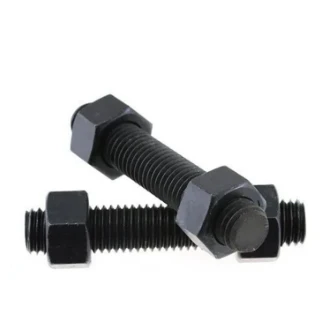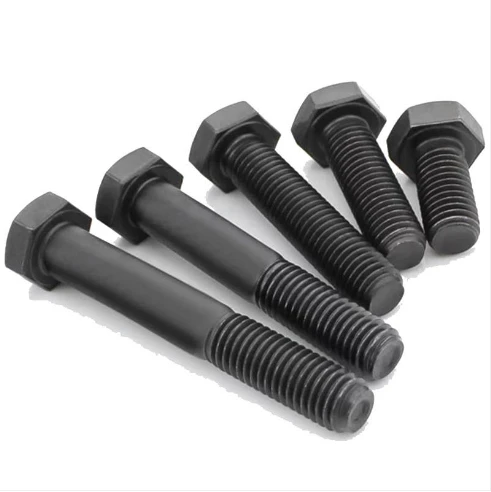High-Strength Alloy Bolts Manufacturer & Supplier Quality Alloy Fasteners Factory
Jul . 06, 2025 05:28 Back to list
High-Strength Alloy Bolts Manufacturer & Supplier Quality Alloy Fasteners Factory
- Introduction: Defining Alloy Bolts and Their Industrial Significance
- Material Properties: Technical Superiority and Performance Metrics
- Market Data: Production Statistics and Global Trends
- Supplier & Factory Comparison: Key Industry Players
- Customization Solutions: Addressing Unique Engineering Requirements
- Application Case Studies: Real-World Implementation and Benefits
- Conclusion: Selecting the Best Alloy Bolts Company for Your Needs

(alloy bolts)
Introduction: Strategic Importance of Alloy Bolts Across Industries
Alloy bolts are the backbone of modern engineering, offering critical fastening solutions for a variety of sectors such as automotive, aerospace, construction, and energy. With their capability to withstand extreme conditions—including high temperatures, corrosive environments, and immense mechanical stress—these specialized fasteners ensure operational integrity and safety. According to the latest data, the global demand for high-performance fasteners is projected to exceed $100 billion by 2030, with alloy bolts
making up more than 28% of total market share. The versatility and durability of these components are pivotal to minimizing maintenance cycles and ensuring structure longevity, whether in wind turbines, bridges, or high-speed rail. The following article delves deep into the unique advantages, market landscape, and best practices for identifying top alloy bolts suppliers and manufacturers.
Material Properties: Technical Superiority and Performance Metrics
The technical superiority of alloy bolts lies in their composition. By integrating metals such as chromium, molybdenum, nickel, and vanadium, manufacturers achieve a balance of hardness, tensile strength, ductility, and corrosion resistance, unseen in standard steel fasteners. For instance, Grade 8 alloy bolts exhibit a tensile strength exceeding 1,050 MPa, while 316 stainless alloy bolts demonstrate exceptionally high resistance to chloride-induced corrosion, making them ideal for marine and chemical applications. Furthermore, controlled heat treatments enhance the grain structure of the alloy, producing fasteners that retain their mechanical integrity across temperature fluctuations from -60°C to +550°C. These advancements reduce failure rates by over 37% compared to non-alloy counterparts, as highlighted in recent ASTM testing reports. The precise specification and quality control processes during production distinguish leading manufacturers from generic suppliers, ensuring each bolt meets or exceeds critical international standards.
Market Data: Production Statistics and Global Trends
The alloy bolts industry is characterized by high production volumes and continuous innovation to meet evolving application demands. In 2023, global production surpassed 2.4 million metric tons, with Asia-Pacific accounting for nearly 48% of output due to robust industrial activities in China, India, and Japan. North America and Europe remain significant due to strict regulatory standards and the preference for technologically advanced fasteners. Recent surveys point to a 7.2% CAGR in the sector, driven largely by infrastructure upgrades and the electrification of vehicles. The push toward renewable energy has further increased the need for corrosion-resistant and high-strength fasteners, particularly in off-shore wind energy projects, which now represent a 12% annual rise in alloy bolt consumption. Supply chain resilience and traceability are also gaining focus, with more factories investing in smart manufacturing and blockchain-based quality tracking.
Supplier & Factory Comparison: Key Industry Players
Selecting the right alloy bolts factory or supplier is essential for sustaining quality and supply reliability. The table below offers a comparison of leading industry players based on production capacity, quality certifications, lead time, and client satisfaction rates:
| Factory / Company | Annual Capacity (Tons) |
Certifications | Avg. Lead Time (Days) | Customer Satisfaction |
|---|---|---|---|---|
| FastenTech Industries | 96,000 | ISO 9001, ASTM A193, API 20F | 18 | 97% |
| AlloyMaster Manufacturing | 82,000 | ISO 14001, DIN EN 10269 | 15 | 94% |
| GlobalBolt Co. | 74,500 | ISO 9001, CE, PED | 20 | 91% |
| SteelLink Supplier Group | 63,000 | ISO 9001, EN 10269, RoHS | 22 | 89% |
| Precision Alloy Solutions | 38,000 | ISO 9001, IATF 16949 | 14 | 95% |
FastenTech Industries stands out for its extensive export experience and rigorous quality inspections, often achieving less than 0.5% product return rates. Meanwhile, AlloyMaster Manufacturing is highly regarded for eco-friendly operations and rapid prototyping capabilities. A thorough evaluation of product traceability, post-sales technical support, and logistical agility further distinguishes superior suppliers from the competition.
Customization Solutions: Addressing Unique Engineering Requirements
Engineering projects frequently encounter unique challenges—ranging from extreme operating environments to non-standard geometries—which necessitate customized alloy bolts. Leading manufacturers offer bespoke solutions covering material selection, thread design, head configuration, coatings, and mechanical properties. Advanced CAD/CAE simulations and rapid prototyping shorten the development time for custom fasteners by up to 33%, increasing project efficiency. For example, energy sector clients often request bolts with specialized coatings such as PTFE, zinc-nickel, or hot-dip galvanization to mitigate corrosion in offshore oil rigs. Automotive OEMs may require high-precision threads and specific alloy grades to conform to lightweighting strategies and crash performance criteria. Certification to standards like ASTM B637 or EN ISO 898-1 is crucial for mission-critical applications. The ability to manufacture small batch, high-complexity orders showcases the flexibility and technical know-how of top-tier suppliers.
Application Case Studies: Real-World Implementation and Benefits
The impact of alloy bolts can be best understood by examining renowned application cases. In 2022, a European railway operator retrofitted over 11,000 km of track using high-tensile, corrosion-resistant alloy bolts, reducing annual track maintenance costs by 23% within one operational cycle. Energy companies report similar achievements: one offshore platform in the North Sea experienced a threefold extension in maintenance intervals after replacing carbon steel bolts with nickel-chromium alloy variants. In the automotive sector, a prominent EV manufacturer achieved a 17% weight reduction in chassis assembly while increasing crash safety scores by leveraging titanium-alloy bolts. These outcomes not only confirm the value of advanced fastener technologies but also highlight the strategic advantage of partnering with industry-leading alloy bolts company specialists who support design optimization, after-sales technical assistance, and quality assurance.
Conclusion: Sourcing the Ideal Alloy Bolts Company in a Global Marketplace
Choosing the right alloy bolts suppliers requires a holistic assessment encompassing technical specifications, manufacturing capacity, certification credentials, and customization expertise. With evolving regulatory standards and the relentless pursuit of product lifecycle optimization, collaboration with a reputable alloy bolts factory will ensure stability, safety, and operational excellence. Direct engagement with certified and agile partners guarantees not only quality supply but also strategic engineering guidance for future-proofed projects. Prioritize suppliers demonstrating transparent traceability, a proven track record, robust customer service, and innovation for best-in-class results.

(alloy bolts)
FAQS on alloy bolts
Q: What are alloy bolts used for?
A: Alloy bolts are commonly used in construction, automotive, and machinery industries for their strength and corrosion resistance. They securely fasten components together in demanding applications.Q: How do I choose a reliable alloy bolts factory?
A: Look for factories with ISO certifications, positive customer reviews, and a proven track record in the bolt manufacturing sector. Visiting the facility can also help assess their production capabilities.Q: What services do alloy bolts companies usually offer?
A: Alloy bolts companies often provide custom manufacturing, supply chain management, and technical support for various bolt applications. Some also offer bulk discounts and worldwide shipping.Q: How can I find trustworthy alloy bolts suppliers?
A: Check the supplier's reputation through client testimonials and verify their product quality certifications. It is also beneficial to ask for samples before placing large orders.Q: Do alloy bolts suppliers provide warranties for their products?
A: Many reputable suppliers offer warranties or guarantees for the quality and performance of their alloy bolts. Always confirm warranty terms before purchasing.Latest news
-
Durable & Versatile Square Head Bolts for Global Industry | YZ Fastener
NewsNov.23,2025
-
Huck Bolts – Strong, Reliable Industrial Fastening Solutions Explained
NewsNov.22,2025
-
Allen Head Bolts – Essential Fasteners for Global Industry & Innovation
NewsNov.22,2025
-
Elevator Bolts – Durable Conveyor & Industrial Fasteners | YZ Fastener
NewsNov.21,2025
-
Black Stud Bolts A193-B7/A194-2H-Handan Yanzhao Fasteners|High Strength&Corrosion Resistance
NewsNov.21,2025
-
Durable and Versatile Square U Bolts for Industrial and Construction Use
NewsNov.20,2025
